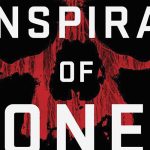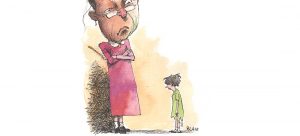
The Cruelest Month
And why it’s good for us
By Brian Lampkin
Why do we read depressing books? What compels us to look at despair and think of it as entertainment? You’ll be hard-pressed to find a novel in the so-called canon of American literature that isn’t bleak, disturbing or downright devastating. One theory argues that reading about sorrow provides us with a little inoculation against the very real grief that’s coming for us all. We read as a way to prepare, as a way to get ready for the death of our parents, the loss of our friends, the overthrow of democratic governments. Perhaps we’ll be more ready, more able to emotionally deal with despair because we’ve read exquisite works that delve into it without looking away. We’re ready. We’ve been vaccinated.
And we all (OK, not quite all of us) want to be vaccinated. In this month’s column, we’ll look at books publishing this month and think of the ways they may offer some protection. From COVID and disease, for sure, but also from less tangible ailments of our current condition.
The Basic Laws of Human Stupidity, by Carlo M. Cipolla (Doubleday, $15).
The Laws:
1. Everyone underestimates the number of stupid individuals among us.
2. The probability that a certain person is stupid is independent of any other characteristic of that person.
3. A stupid person is a person who causes losses to another person while deriving no gain and even possibly incurring losses themselves.
4. Nonstupid people always underestimate the damaging power of stupid individuals.
5. A stupid person is the most dangerous type of person.
If only there were an inoculation against stupidity — I would have been spared so many awful decisions!
Women of the Pandemic: Stories from the Front Lines of COVID-19, by Lauren McKeon (McClelland & Stewart, $18). In Canada, women are leading the fast-paced search for a vaccine. They are leading their provinces and territories. At home, they are leading families through self-isolation, often bearing the responsibility for their physical and emotional health. They are figuring out what working from home looks like, and many of them are doing it while homeschooling their kids. Women crafted the blueprint for kindness during the pandemic, from sewing masks to kicking off international mutual-aid networks. And, perhaps not surprisingly, women have also suffered some of the biggest losses, bearing the brunt of our economic skydive. Through intimate portraits of Canadian women in diverse situations and fields, Women of the Pandemic is a gripping narrative record of the early months of COVID-19, a clear-eyed look at women’s struggles, which highlights their creativity, perseverance and resilience as they charted a new path forward during impossible times.
Broken (in the Best Possible Way), by Jenny Lawson (Henry Holt and Co., $27.99). As Jenny Lawson’s hundreds of thousands of fans know, she suffers from depression. In Broken, Lawson brings readers along on her mental and physical health journey, offering heartbreaking and hilarious anecdotes along the way. With people experiencing anxiety and depression now more than ever, the author humanizes what we all face in an all-too-real way, reassuring us that we’re not alone and making us laugh while doing it. From the business ideas that she wants to pitch to Shark Tank to the reason why Lawson can never go back to the post office, Broken leaves nothing to the imagination in the most satisfying way. And of course, Lawson’s long-suffering husband, Victor — the Ricky to Jenny’s Lucille Ball — is present throughout.
The Light of Days: The Untold Story of Women Resistance Fighters in Hitler’s Ghettos, by Judy Batalion (William Morrow, $28.99). As propulsive and thrilling as Hidden Figures, In the Garden of Beasts, Band of Brothers and A Train in Winter, The Light of Days at last tells the true story of these incredible women whose courageous yet little-known feats have been eclipsed by time. Judy Batalion — granddaughter of Polish Holocaust survivors — takes us back to 1939 and introduces us to Renia Kukielka, a weapons smuggler and messenger who risked death traveling across occupied Poland on foot and by train. Joining Renia are other women who served as couriers, armed fighters, intelligence agents and saboteurs — all who put their lives in mortal danger to carry out their missions. Batalion follows these women through the savage destruction of the ghettos, arrest and internment in Gestapo prisons and concentration camps, and for a lucky few — like Renia, who orchestrated her own audacious escape from a brutal Nazi jail — into the late 20th century and beyond.
First, Become Ashes, by K. M. Szpara (Tor, $27.99). Two quotes sum it up:
“A timely tale about the dangers of committing too fervently and unquestioningly to a person and their cause.” — Kirkus Reviews
“A standalone about the complicated ways we cope with trauma, about balancing acceptance and truth, and about belief in its darkest and brightest forms.” – Booklist
Definitely a book for our times. Szpara will be part of our 2021 Greensboro Bound Festival and will be in conversation with novelist Rivers Solomon.
Sing Backwards and Weep: A Memoir, by Mark Lanegan (Hachette Books, $17.99). If you know the music of Mark Lanegan, then you know what you’re in for: an unflinching look at darkness. One critic describes this book as “one of the most compelling accounts of squalor and misery ever committed to paper.” Not your cup of awful? Maybe Lanegan goes through it all so you don’t have to.
Other notable April releases: Whereabouts, by Jhumpa Lahiri (Knopf, $24), First Person Singular: Stories, by Haruki Murakami (Knopf, $28), World Travel: An Irreverent Guide, by Anthony Bourdain (Ecco Press, $35) and The Man Who Lived Underground, by Richard Wright (Library of America, $22.95). OH
Brian Lampkin is one of the proprietors of Scuppernong Books.





